Xiaojin Fu
Merging Beyond: Streaming LLM Updates via Activation-Guided Rotations
Feb 03, 2026Abstract:The escalating scale of Large Language Models (LLMs) necessitates efficient adaptation techniques. Model merging has gained prominence for its efficiency and controllability. However, existing merging techniques typically serve as post-hoc refinements or focus on mitigating task interference, often failing to capture the dynamic optimization benefits of supervised fine-tuning (SFT). In this work, we propose Streaming Merging, an innovative model updating paradigm that conceptualizes merging as an iterative optimization process. Central to this paradigm is \textbf{ARM} (\textbf{A}ctivation-guided \textbf{R}otation-aware \textbf{M}erging), a strategy designed to approximate gradient descent dynamics. By treating merging coefficients as learning rates and deriving rotation vectors from activation subspaces, ARM effectively steers parameter updates along data-driven trajectories. Unlike conventional linear interpolation, ARM aligns semantic subspaces to preserve the geometric structure of high-dimensional parameter evolution. Remarkably, ARM requires only early SFT checkpoints and, through iterative merging, surpasses the fully converged SFT model. Experimental results across model scales (1.7B to 14B) and diverse domains (e.g., math, code) demonstrate that ARM can transcend converged checkpoints. Extensive experiments show that ARM provides a scalable and lightweight framework for efficient model adaptation.
TrimR: Verifier-based Training-Free Thinking Compression for Efficient Test-Time Scaling
May 22, 2025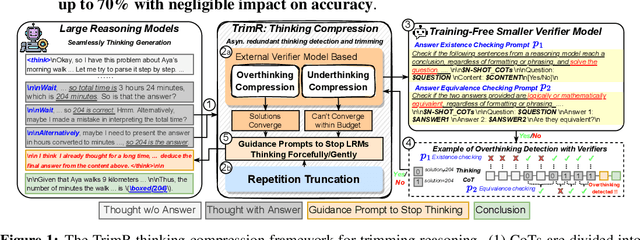
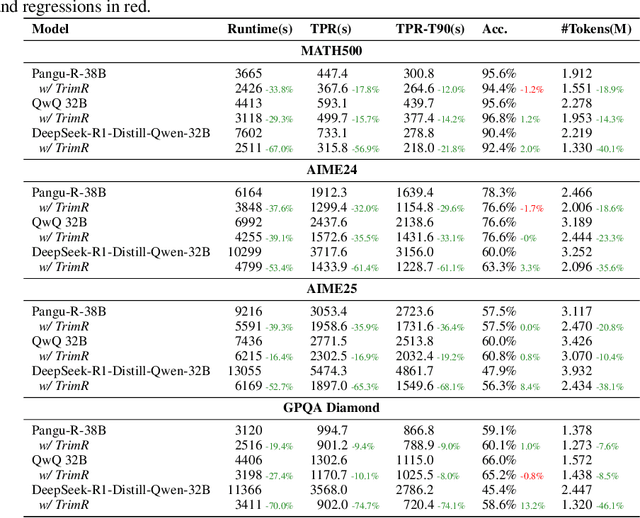


Abstract:Large Reasoning Models (LRMs) demonstrate exceptional capability in tackling complex mathematical, logical, and coding tasks by leveraging extended Chain-of-Thought (CoT) reasoning. Test-time scaling methods, such as prolonging CoT with explicit token-level exploration, can push LRMs' accuracy boundaries, but they incur significant decoding overhead. A key inefficiency source is LRMs often generate redundant thinking CoTs, which demonstrate clear structured overthinking and underthinking patterns. Inspired by human cognitive reasoning processes and numerical optimization theories, we propose TrimR, a verifier-based, training-free, efficient framework for dynamic CoT compression to trim reasoning and enhance test-time scaling, explicitly tailored for production-level deployment. Our method employs a lightweight, pretrained, instruction-tuned verifier to detect and truncate redundant intermediate thoughts of LRMs without any LRM or verifier fine-tuning. We present both the core algorithm and asynchronous online system engineered for high-throughput industrial applications. Empirical evaluations on Ascend NPUs and vLLM show that our framework delivers substantial gains in inference efficiency under large-batch workloads. In particular, on the four MATH500, AIME24, AIME25, and GPQA benchmarks, the reasoning runtime of Pangu-R-38B, QwQ-32B, and DeepSeek-R1-Distill-Qwen-32B is improved by up to 70% with negligible impact on accuracy.
Beyond Standard MoE: Mixture of Latent Experts for Resource-Efficient Language Models
Mar 29, 2025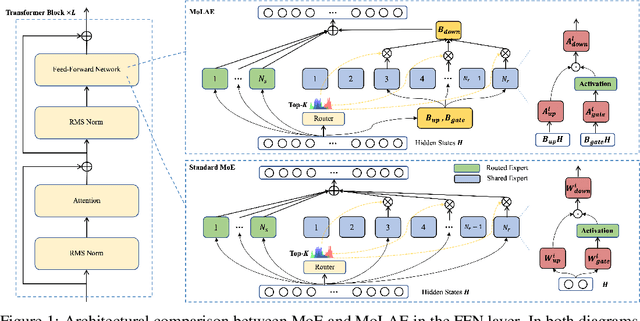


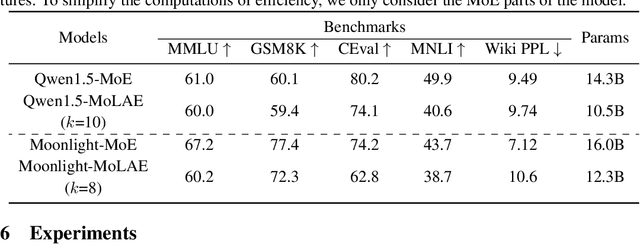
Abstract:Mixture of Experts (MoE) has emerged as a pivotal architectural paradigm for efficient scaling of Large Language Models (LLMs), operating through selective activation of parameter subsets for each input token. Nevertheless, conventional MoE architectures encounter substantial challenges, including excessive memory utilization and communication overhead during training and inference, primarily attributable to the proliferation of expert modules. In this paper, we introduce Mixture of Latent Experts (MoLE), a novel parameterization methodology that facilitates the mapping of specific experts into a shared latent space. Specifically, all expert operations are systematically decomposed into two principal components: a shared projection into a lower-dimensional latent space, followed by expert-specific transformations with significantly reduced parametric complexity. This factorized approach substantially diminishes parameter count and computational requirements. Beyond the pretraining implementation of the MoLE architecture, we also establish a rigorous mathematical framework for transforming pre-trained MoE models into the MoLE architecture, characterizing the sufficient conditions for optimal factorization and developing a systematic two-phase algorithm for this conversion process. Our comprehensive theoretical analysis demonstrates that MoLE significantly enhances computational efficiency across multiple dimensions while preserving model representational capacity. Empirical evaluations corroborate our theoretical findings, confirming that MoLE achieves performance comparable to standard MoE implementations while substantially reducing resource requirements.
Unlocking Efficient Long-to-Short LLM Reasoning with Model Merging
Mar 26, 2025



Abstract:The transition from System 1 to System 2 reasoning in large language models (LLMs) has marked significant advancements in handling complex tasks through deliberate, iterative thinking. However, this progress often comes at the cost of efficiency, as models tend to overthink, generating redundant reasoning steps without proportional improvements in output quality. Long-to-Short (L2S) reasoning has emerged as a promising solution to this challenge, aiming to balance reasoning depth with practical efficiency. While existing approaches, such as supervised fine-tuning (SFT), reinforcement learning (RL), and prompt engineering, have shown potential, they are either computationally expensive or unstable. Model merging, on the other hand, offers a cost-effective and robust alternative by integrating the quick-thinking capabilities of System 1 models with the methodical reasoning of System 2 models. In this work, we present a comprehensive empirical study on model merging for L2S reasoning, exploring diverse methodologies, including task-vector-based, SVD-based, and activation-informed merging. Our experiments reveal that model merging can reduce average response length by up to 55% while preserving or even improving baseline performance. We also identify a strong correlation between model scale and merging efficacy with extensive evaluations on 1.5B/7B/14B/32B models. Furthermore, we investigate the merged model's ability to self-critique and self-correct, as well as its adaptive response length based on task complexity. Our findings highlight model merging as a highly efficient and effective paradigm for L2S reasoning, offering a practical solution to the overthinking problem while maintaining the robustness of System 2 reasoning. This work can be found on Github https://github.com/hahahawu/Long-to-Short-via-Model-Merging.
Large Language Models are Good Multi-lingual Learners : When LLMs Meet Cross-lingual Prompts
Sep 17, 2024



Abstract:With the advent of Large Language Models (LLMs), generating rule-based data for real-world applications has become more accessible. Due to the inherent ambiguity of natural language and the complexity of rule sets, especially in long contexts, LLMs often struggle to follow all specified rules, frequently omitting at least one. To enhance the reasoning and understanding of LLMs on long and complex contexts, we propose a novel prompting strategy Multi-Lingual Prompt, namely MLPrompt, which automatically translates the error-prone rule that an LLM struggles to follow into another language, thus drawing greater attention to it. Experimental results on public datasets across various tasks have shown MLPrompt can outperform state-of-the-art prompting methods such as Chain of Thought, Tree of Thought, and Self-Consistency. Additionally, we introduce a framework integrating MLPrompt with an auto-checking mechanism for structured data generation, with a specific case study in text-to-MIP instances. Further, we extend the proposed framework for text-to-SQL to demonstrate its generation ability towards structured data synthesis.
Learning From Correctness Without Prompting Makes LLM Efficient Reasoner
Mar 28, 2024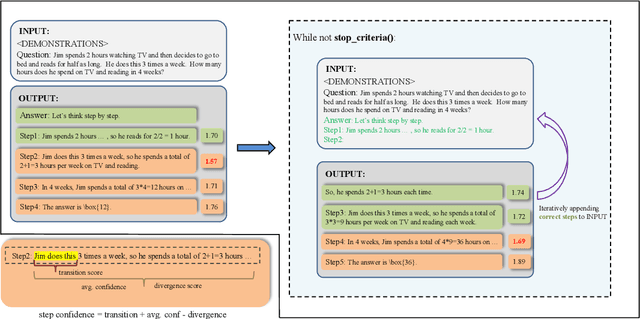



Abstract:Large language models (LLMs) have demonstrated outstanding performance across various tasks, yet they still exhibit limitations such as hallucination, unfaithful reasoning, and toxic content. One potential approach to mitigate these issues is learning from human or external feedback (e.g. tools). In this paper, we introduce an intrinsic self-correct reasoning framework for LLMs that eliminates the need for human feedback, external tools, and handcraft prompts. The proposed framework, based on a multi-step reasoning paradigm \textbf{Le}arning from \textbf{Co}rrectness (\textsc{LeCo}), improves reasoning performance without needing to learn from errors. This paradigm prioritizes learning from correct reasoning steps, and a unique method to measure confidence for each reasoning step based on generation logits. Experimental results across various multi-step reasoning tasks demonstrate the effectiveness of the framework in improving reasoning performance with reduced token consumption.
Are LLMs Rigorous Logical Reasoner? Empowering Natural Language Proof Generation with Contrastive Stepwise Decoding
Nov 12, 2023
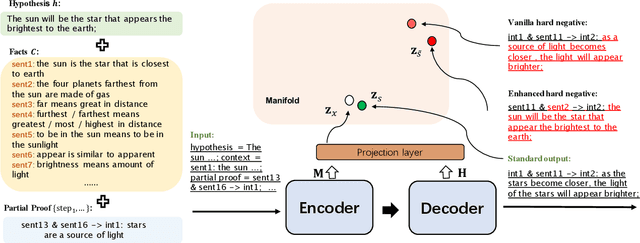

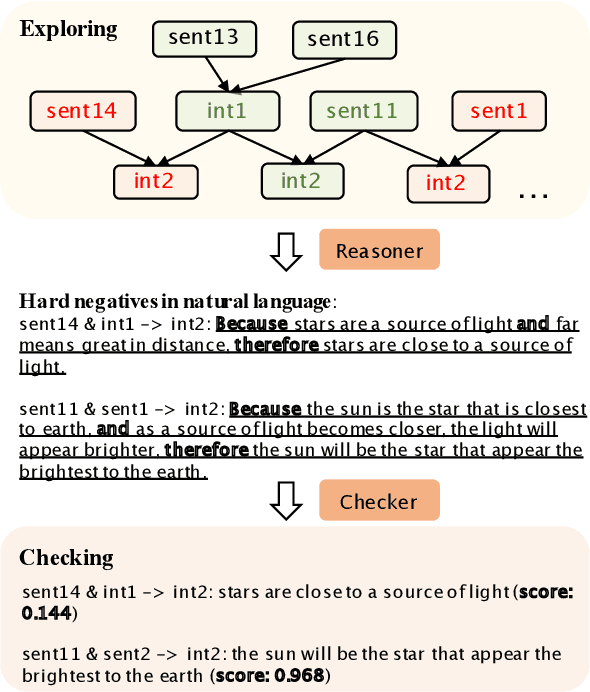
Abstract:Logical reasoning remains a pivotal component within the realm of artificial intelligence. The recent evolution of large language models (LLMs) has marked significant progress in this domain. The adoption of strategies like chain-of-thought (CoT) has enhanced the performance of LLMs across diverse reasoning tasks. Nonetheless, logical reasoning that involves proof planning, specifically those that necessitate the validation of explanation accuracy, continues to present stumbling blocks. In this study, we first evaluate the efficacy of LLMs with advanced CoT strategies concerning such tasks. Our analysis reveals that LLMs still struggle to navigate complex reasoning chains, which demand the meticulous linkage of premises to derive a cogent conclusion. To address this issue, we finetune a smaller-scale language model, equipping it to decompose proof objectives into more manageable subgoals. We also introduce contrastive decoding to stepwise proof generation, making use of negative reasoning paths to strengthen the model's capacity for logical deduction. Experiments on EntailmentBank underscore the success of our method in augmenting the proof planning abilities of language models.
 Add to Chrome
Add to Chrome Add to Firefox
Add to Firefox Add to Edge
Add to Edge